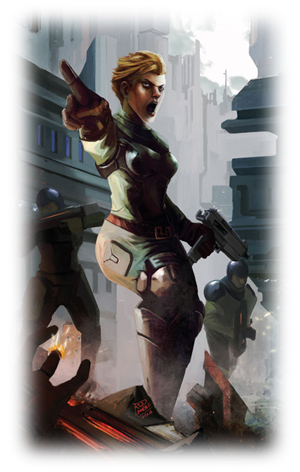Principles of Planet Mercenary's Design
The Planet Mercenary Kickstarter just crossed the $150,000 mark, unlocking the The Seventy Maxims of Maximally Effective Mercenaries in hardback. There's a pledge level that ships that book, and only that book, if that's what you want.
If you've been waiting for a Seventy Maxims text, it's part of the Kickstarter now.
For those of you interested in the role playing game, however, I want to talk about some of our design principles, how we arrived at them, and what they mean for players and game chiefs.
1) Story Comes First
This might not be immediately obvious, but this design principle grows straight out of the First Law of the Schlockiverse: "There Will Be A Punchline." We won't let complex calculations drown the story. Players should be able to very quickly see that the thing they want to do has an associated bonus or penalty, and that their success or failure will be determined just as quickly with a single throw of the dice.
2) Abstract Everything Up
Every game is a physics simulation of a sort. We can't do away with physics altogether, and we don't want to. Our goal however, is to treat the physics as abstractly as possible without violating the laws of nature.
 A good example of this is your party's grunts. You may have a hundred NPCs in your employ, and in combat this company of sophonts will all be fighting with you. But we won't be rolling for them individually, because that way lies madness.
A good example of this is your party's grunts. You may have a hundred NPCs in your employ, and in combat this company of sophonts will all be fighting with you. But we won't be rolling for them individually, because that way lies madness. Your character's combat rolls will be handled individually, of course, but the fire team alongside you will be handled en masse, with a single roll determining how they fare during this turn. That group of six grunts will be treated, in a sense, as if they're a single character, with bonuses and penalties that stem from how you've been treating them, and how effectively you're issuing orders.
"Abstract everything up" means that you can shout "suppressing fire!" during your heroic leap. A throw of the dice will then determine whether or not your crew is covering you while you dive for the airlock controls armed only with a logic probe and a bowl of chili.
3) Failure is Fun
This principle has been the hardest to get across. Many role-players want to game the system so that they can't die, and can't even really get hurt. Many games are designed around "balanced" encounters which ensure that the party only loses a fight when that loss has been scripted.
That is not this game. You will fail. You will die. You will lose teammates and gear and reputation, and the whole time it's happening you will be enjoying it because it's going to put you in the middle of the best story you've ever told. And it's going to make the end of that story the sweetest, most awesome thing you've ever heard.
Hyperbole? Perhaps. But we built this game with that end in mind.
If your character dies, you immediately head-hop into a member of your fire team, who has just received a battlefield promotion. Will she swear vengeance upon your killers? Perhaps not. She might say "it took that jackwagon way too long to catch a bullet. I'm done taking orders. I'm giving them now." Your first character's failure to survive the cascade of hot, jacketed metal becomes your second character's opportunity to become the Heroine of the Resistance.
4) Role Play is Learning
Many role playing games have a learning curve that is built around figuring out the "builds." Once you know how to build a tank, or a healer, or a suicide ranger, the probability curves bend in your favor, and you win. All the time.
Planet Mercenary has a learning curve that wraps around the other players. The timed initiative system ("Spoke first? Goes first") may seem at first to be an invitation for the loudmouth to dominate the game. And it is. And then it is a thrown gauntlet, an open challenge for the rest of the players to take the game back, and to turn the loudmouth back into a party member.
Your game group will grow and change. You will learn to react to one another, and with practice you will become a well-oiled machine in combat. You may need the guidance of a wise Game Chief to make this transition, but when it happens you will be amazed by each other. And that? Oh, that's so much more fulfilling than having an ironclad DPS build on a sheet of paper.
5) No Backsies
Did you state an action and then realize it was dumb? The fastest way to derail a game forever is to allow phrases like "no, wait, that's not what I do" or "no, you didn't do that" to affect previous events. See those sections above on "failure is fun" and "role play is learning?" Yeah... no backsies is how that happens.
And by the same token, we're not backing down from this. Our design principles are bold ones, and they differentiate Planet Mercenary from every other game we've played. Yes, we risk losing a few players by saying this, but if what you want is to always succeed and to have exact numerical values to describe every aspect of your character's physical form, equipment, and training, Planet Mercenary is not the game you're looking for.
We think it's a lot better than the game you're looking for, and that, too, is a position from which we're not allowing ourselves any backsies.
(If we fail, it's going to make a *great* story.)
(cross-posted from the Planet Mercenary Developer's Journal)


